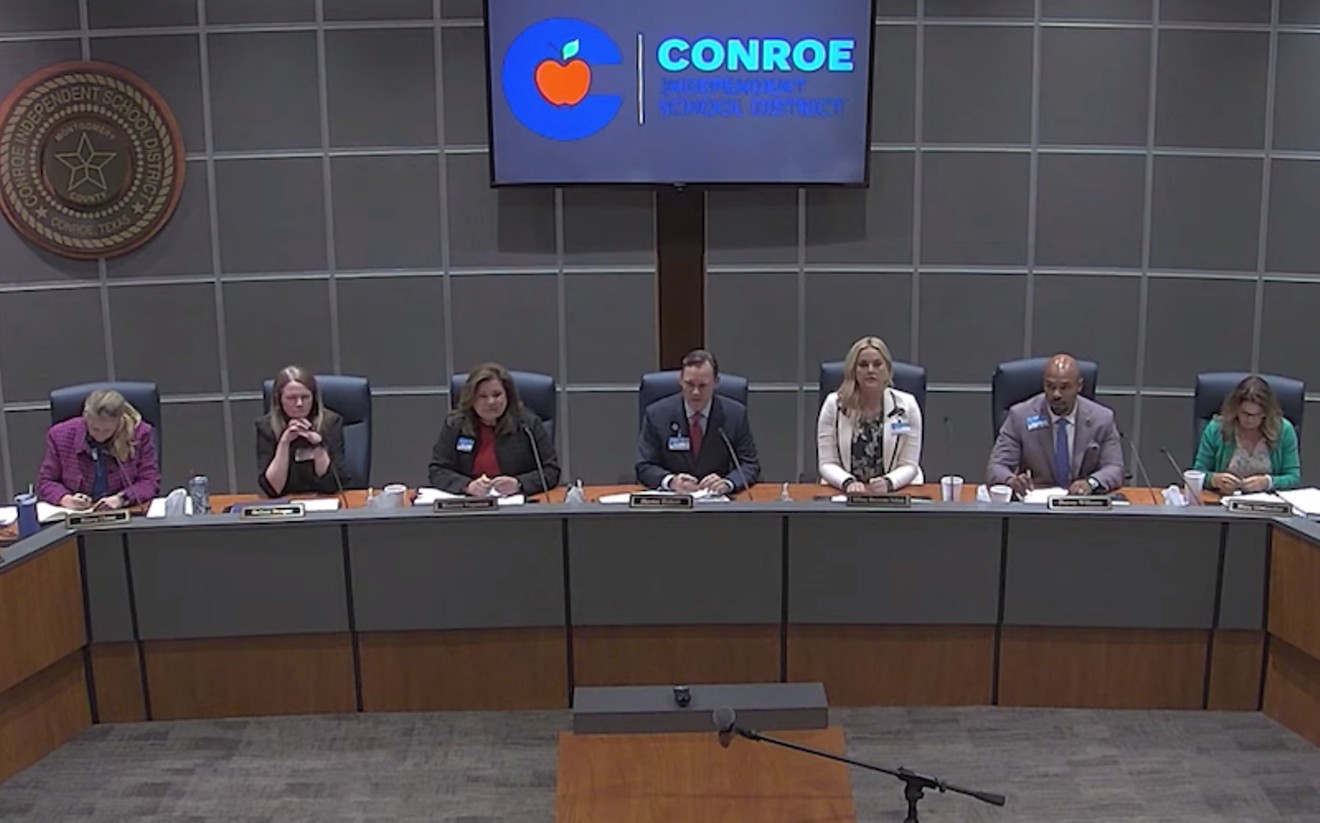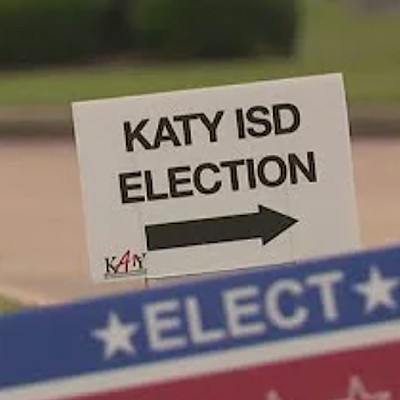After a number of parents contacted Conroe ISD Trustee Stacey Chase asking if they could challenge book removals from library and classroom shelves, the board discussed possible additions to the district's policies and procedures without taking any formal action Tuesday night.
District administrators said the district's standard complaint policy creates an avenue to oppose book reconsideration requests, but some trustees argued a more direct line for community members to fight against and have knowledge of these removals is needed.
Especially as some district parents and staff were unaware that a complaint could be filed for this reason. Chase first requested the board revisit the district's policies during last month's board meeting after the vote occurred to throw out over 100 individual titles. Most of these were recent classroom collection removals from informal reviews.
“I just want to remind everyone what was on that list. I mean, classics were on that list like Brave New World and Charles Dickens,” Chase said. “There are things on there that we would all recognize and say, ‘Hey, I had access to that when I was in school, and maybe I didn’t love Charles Dickens, but maybe I should’ve had access to that, and maybe I should’ve read those classics.”
Any parent, individual community member or outside interest group can bring an informal challenge directly to the district for reconsideration by an informal review committee. An informal review avoids the processes of a formal review. However, these requests are reviewed by these committees. An informal reconsideration committee for library materials typically consists of seven to eight librarians.
In a formal review, the challenger files for reconsideration. A formal reconsideration committee comprised of an administrator, staff member, educator and randomly selected parents reviews the book. The person can then choose to accept the committee's decision or appeal it to the board.
Chase called for the district to re-evaluate informal reviews and add language to its policies and online FAQs to direct individuals where to go if they want to file a complaint. This would make guidelines accessible to those wishing to oppose formal and informal reconsiderations.
Conroe ISD General Counsel Carrie Galatas confirmed there was no appeal process in district policy to challenge informal or formal reviews because it wouldn’t be the “appropriate place” for such a process.
“We have standard complaint policies in our district for people that are aggrieved by any decision that you, we, a campus, or a teacher makes," Galatas said. "They can file a complaint complaining about that action."
“That would be the process since we update our website routinely with the books that have been reviewed and the decisions that have been made,” she added. “A person would be able to file a complaint if they routinely monitor that site if this is an issue that’s important to them.”
According to Galatas, the complaint could ultimately make its way to the board, if the individual who filed it appealed for a hearing before the trustees.
“If it ultimately ends up back at us anyway, why do we set our librarians up to take the heat for this? This [informal review] is not prompted by them [librarians] doing their jobs,” Chase said. “This is prompted by people emailing them, and to be clear, we have special interest groups emailing them a mass of books to review. People I am not even sure actually live in the district, let alone are parents of kids in our district.”
“If the expectation is that the libraries are curated based on our [the board’s] policy,” she added. “It should not be prompted by an email from Citizens Defending Freedom [a multi-state conservative political action organization] to review dozens of books and pull them.”
Chase also questioned how a person who wasn’t versed in board policy would know to file a complaint and the criteria requirements to abide by, such as having it done within 15 days of when the person first knew or "with reasonable diligence" should have known about the event.
She doubled down, saying that some of the district's more engaged community members did not think they had recourse or knew this was an option.
“I think there is a missing link for people — for it — to go both ways,” Chase said. “There’s a general vibe with that policy about how you take books out of our libraries. It is really set up for that to succeed. Honestly, as a parent of kiddos in this district, it has moved scarily fast — that informal reconsideration move.”
According to a district teacher who requested anonymity, some instructors first learned about the option to file a complaint about two weeks ago and could've been initially misled to think it was a more severe move as the process has also been described as a "legal grievance."
“Did they really think nobody cared that these books were removed? Maybe they thought it should’ve been obvious, and it wasn’t," the teacher said. "Many of these books disappeared, and maybe they [parents and other community members] haven’t paid attention to that before, and now they have.”
Galatas said librarians remove books for a variety of reasons. These removals can stem from the need to weed out older or out-of-use books. But Chase said it’s unclear that's what is happening. She added that it was past the point to distinguish the reasons why the recent removals occurred.
At least some of these titles are currently boxed up in a district warehouse and awaiting listing in an upcoming auction. The teacher said they didn’t think they could appeal the recent removals but were planning on doing so anyway.
Conroe ISD Superintendent Dr. Curtis Null agreed with Chase's point that people may not know filing a complaint was an option, referencing the emails he received from people asking how to proceed. He added that the public discussion and any future additions to the website regarding the complaint process would address these concerns and increase awareness of this option.
Trustee Melissa Dungan, one of the three self-declared “mama bears” or slate of conservative board members, echoed this sentiment that information uploaded on the district’s website needed to be front and center for parents and other community members.
Dungan and Trustee Misty Odenweller—a second mama bear—also supported the request that the reasons for these books' status be added online in an extra column. Dungan proposed adding a link where website users could file complaints about informally or formally reviewed texts.
“I don’t think it should only go one way,” Odenweller said. “If someone’s got a complaint, it doesn't matter if they’re for or against. They should have a right to voice that.”
Currently, on the district’s website, many library and classroom collection titles that have been taken off shelves recently or in past years already indicate the reason for removal or restriction is due to not meeting board policies but do not indicate specifics beyond that.
“They might be able to say we pulled it from low readership, but here’s the thing. If it’s on the not permitted list that is not a culled book, that’s not a book pulled out of the library because people aren’t reading it,” the teacher said. "They might have agreed. It might have been an easy decision because nobody had checked it out. But it can’t be not permitted from the district just because people didn’t check it out in the library.”
“Libraries turn over their collections all the time. Our librarian goes through and says, “Oh my gosh, some of these books are 50 years old and haven’t been checked out in 20 years. Let’s make room on the shelf,' the instructor added. "That’s different from not permitting them, removing them from all campuses or sending them back to the district. I think they played semantics a little bit with that.”
Null added that it may also be helpful to include a notification on the web pages of books removed or restricted that the lists would be updated monthly or as additions are needed so individuals interested could keep tabs on these titles.
However, Null pushed back on Chase's request to add language to district policies, adding that it was a procedural process that didn’t require a policy change.
Galatas advised the board that including the complaint process in district policy would not be “best practice.”
“You have, I don’t know, a thousand policies, and we don’t put if you don’t like this one, you can go file a complaint under any of these,” she said. "The policy manual is searchable by word. Anyone who can get there can type ‘complaint’ in and find out how to do it, or on the website, it takes you right to the place to file complaints where those policies are.”
Support Us
Houston's independent source of
local news and culture
account
- Welcome,
Insider - Login
- My Account
- My Newsletters
- Contribute
- Contact Us
- Sign out
Conroe ISD Trustees Discuss How Residents Opposed to Throwing Out Books Can File a Complaint
Faith Bugenhagen March 21, 2024 4:30AM

The Conroe ISD Board of Trustees debated what additions to make, if any, to make it easier for parents and community members to challenge titles that are being reconsidered by the district.
Screenshot
[
{
"name": "Related Stories / Support Us Combo",
"component": "11591218",
"insertPoint": "4",
"requiredCountToDisplay": "4"
},{
"name": "Air - Billboard - Inline Content",
"component": "11591214",
"insertPoint": "2/3",
"requiredCountToDisplay": "7"
},{
"name": "R1 - Beta - Mobile Only",
"component": "12287027",
"insertPoint": "8",
"requiredCountToDisplay": "8"
},{
"name": "Air - MediumRectangle - Inline Content - Mobile Display Size 2",
"component": "11591215",
"insertPoint": "12",
"requiredCountToDisplay": "12"
},{
"name": "Air - MediumRectangle - Inline Content - Mobile Display Size 2",
"component": "11591215",
"insertPoint": "4th",
"startingPoint": "16",
"requiredCountToDisplay": "12"
}
]
KEEP THE HOUSTON PRESS FREE...
Since we started the Houston Press, it has been defined as the free, independent voice of Houston, and we'd like to keep it that way. With local media under siege, it's more important than ever for us to rally support behind funding our local journalism. You can help by participating in our "I Support" program, allowing us to keep offering readers access to our incisive coverage of local news, food and culture with no paywalls.
Trending News
- Column: Opting Out of the STAAR Test Requires a Law Degree Or Iron Will
- Former Katy ISD Trustees Band Together To Support Two Trustees Running For Re-Election
- HISD Scrambles As it Admits Its EOY Assessment Data is Wrong [UPDATED]
-
Sponsored Content From: [%sponsoredBy%]
[%title%]

Don't Miss Out
SIGN UP for the latest
news, free stuff and more!
Become a member to support the independent voice of Houston
and help keep the future of the Houston Press FREE
Use of this website constitutes acceptance of our
terms of use,
our cookies policy, and our
privacy policy
The Houston Press may earn a portion of sales from products & services purchased through links on our site from our
affiliate partners.
©2024
Houston Press, LP. All rights reserved.





